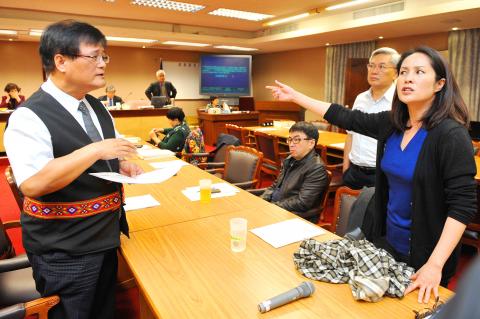Following the Ministry of the Interior’s approval last week for Taoyuan County to be upgraded to a special municipality, several Aboriginal rights advocacy groups yesterday voiced their concern about its negative impact and urged the legislature to amend the Local Government Act (地方制度法) to ensure autonomy in Aboriginal areas.
While many people — including Taoyuan County Commissioner John Wu (吳志揚) — may be happy over the upgrade, which would entail an increase in budget and power, Atayal Aborigines are worried that the change could be a step backward in their struggle for autonomy, and questioned the legality of the decision.
“At the moment, Fusing Township (復興) in Taoyuan County is designated an Aboriginal township with a mayor and a council elected by all residents, and based on the law, the post of mayor can only be filled by an Aborigine,” Yabu Eyo, a representative from a Fusing-based Atayal Aborigines self-help organization, told a news conference at the Legislative Yuan yesterday morning.

Photo: Chien Jung-fong, Taipei Times
“When Taoyuan County becomes a special municipality, Fusing Township would become merely a district, with the head of the district being appointed by the mayor — and we would lose our council as well,” he said. “We are worried that the appointed district chief may not understand Atayal culture, customs and traditions.”
He questioned the legality of the decision, because, based on the Aboriginal Basic Act (原住民族基本法), Aboriginal residents must be consulted and must express their consent when a major change is to be made to a traditional Aboriginal domain.
Omi Wilang, president of the Taoyuan County Association for Sustainable Development of Atayal Communities, said that while Aboriginal residents are not satisfied with Fusing’s current status as a township in a county, “at least we have a minimal degree of autonomy.”
He also questioned the necessity of having six special municipalities in a country as small as Taiwan.
“Look, how many special municipalities are there in China? How many in Japan? Given limited budgets and resources, administrative upgrades have no major positive impact on the people, rather, it hurts our rights,” Omi said.
“We will continue to protest, along with former Aboriginal townships that have been turned into municipal districts in the last wave of administrative upgrades,” he said.
In 2010, the former Aboriginal townships of Namasiya (那瑪夏), Maolin (茂林) and Taoyuan (桃源) became municipal districts when Kaohsiung County was merged with Kaohsiung City and became the special municipality of Greater Kaohsiung. Similar changes also occurred in the current Heping District (和平) in Greater Taichung and Wulai District (烏來) in New Taipei City (新北市).
Pasang Hsiao (蕭世暉), a member of the Association for Taiwan Indigenous Peoples’ Policy, urged the legislature to amend the Local Government Act to either exclude Aboriginal townships from administrative upgrades, or grant special municipalities the power to create special administrative regions for former Aboriginal townships.
“With the administrative upgrade, the level of autonomy of Aboriginal townships should have been upgraded, not eliminated,” Hsiao said.
Chinese Nationalist Party (KMT) Legislator Kung Wen-chi (孔文吉), a Sediq Aborigine, voiced his full support for the activists.
He said by telephone that had proposed amendments granting special status to Aboriginal townships, but they were not passed.
Deputy Minister of the Interior Chien Tai-lang (簡太郎) said the ministry understood the wishes of the Aborigines, but it could not make an exception that is not included in law.
“Changing Aboriginal townships to municipal districts is temporary only — until the law on Aboriginal autonomy is passed. When it’s passed, all Aboriginal areas will be granted autonomy,” Chien said.

POLAM KOPITIAM CASE: Of the two people still in hospital, one has undergone a liver transplant and is improving, while the other is being evaluated for a liver transplant A fourth person has died from bongkrek acid poisoning linked to the Polam Kopitiam (寶林茶室) restaurant in Taipei’s Far Eastern Sogo Xinyi A13 Department Store, the Ministry of Health and Welfare said yesterday, as two other people remain seriously ill in hospital. The first death was reported on March 24. The man had been 39 years old and had eaten at the restaurant on March 22. As more cases of suspected food poisoning involving people who had eaten at the restaurant were reported by hospitals on March 26, the ministry and the Taipei Department of Health launched an investigation. The Food and

A fourth person has died in a food poisoning outbreak linked to the Xinyi (信義) branch of Malaysian restaurant chain Polam Kopitiam (寶林茶室) in Taipei, Deputy Minister of Health and Welfare Victor Wang (王必勝) said on Monday. It was the second fatality in three days, after another was announced on Saturday. The 40-year-old woman experienced multiple organ failure in the early hours on Monday, and the family decided not to undergo emergency resuscitation, Wang said. She initially showed signs of improvement after seeking medical treatment for nausea, vomiting and diarrhea, but her condition worsened due to an infection, he said. Two others who

The long-awaited Taichung aquarium is expected to open next year after more than a decade of development. The building in Cingshui District (清水) is to feature a large ocean aquarium on the first floor, coral display area on the second floor, a jellyfish tank and Dajia River (大甲溪) basin display on the third, a river estuary display and restaurant on the fourth, and a cafe and garden on the fifth. As it is near Wuci Fishing Port (梧棲漁港), many are expecting the opening of the aquarium to bring more tourism to the harbor. Speaking at the city council on Monday, Taichung City Councilor

Taiwanese should be mindful when visiting China, as Beijing in July is likely to tighten the implementation of policies on national security following the introduction of two regulations, a researcher said on Saturday. China on Friday unveiled the regulations governing the law enforcement and judicial activities of national security agencies. They would help crack down on “illegal” and “criminal” activities that Beijing considers to be endangering national security, according to reports by China’s state media. The definition of what constitutes a national security threat in China is vague, Taiwan Thinktank researcher Wu Se-chih (吳瑟致) said. The two procedural regulations are to provide Chinese